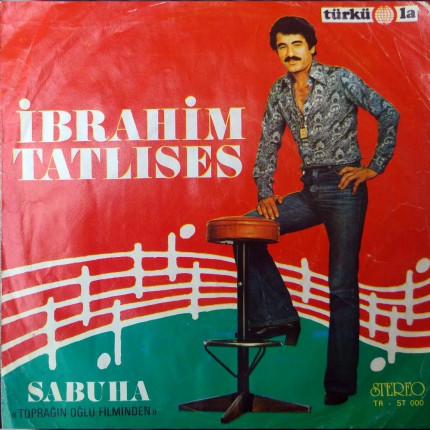
Crazy Turks – Ibrahim Tatlıses, the ‘Emperor’
I’m not here to be the light for anybody’s darkness- I’m burning for my own pleasure.
Ibrahim Tatlises
Every country has its Pavarotti, although not all of them are necessarily shining in posh opera houses. Having the same voice range as the heavy, scarfed tenor from Modena, Ibrahim Tatlıses can certainly be labeled the Turkish Pavarotti. But the story of his life and career is an entirely different one- his is the tale of the rise from bitter poverty to superstardom, a tale filled with machismo, violence, sex, politics, and crime.
„My father is Arab, my mother is Kurdish, I am Turkish“ is how Ibrahim Tatlıses (or ‘Ibo’) sums up his ethnic background, a typical answer in multi-ethnical Turkey. His father was in jail when Tatlıses was born in the city of Urfa, and as one of 7 children to very poor parents, he grew up in a ‘cave’ as he describes it. Ibrahim Tatlıses never went to any school. When years later journalists asked him why not, he sarcastically replied: „It’s not like there had been an Oxford in Urfa and we refused to attend.“, pointing at the poverty and poor infrastructure he was born in. Instead, he started working at a very young age, and had a key-experience in one of his jobs: „I was a kid. In order to earn 20 cents more, I was selling water in the film theatres, shouting ‘Come on, ice cold water’. One day a man suddenly got up from his seat and shouted ‘Shut up you moron, are we going to listen to you?,’ and punched me four times in the face. And these punches are what brought me to where I am today.” And indeed, Tatlıses never forgot where he came from and which humiliating experiences he made at the bottom of society. Up until this day he displays a stubborn pride of the ‘little people’, despite his enormous wealth refusing to participate in any high-society manierisms and behaviour. “Leave me alone with this elitist etiquette, it doesn’t work here, and you better get rid off that ridiculous shit, too” seems to be the underlying, fun-spoiling message in almost everything that he does. Imagining him in a opera house or at some snobbish dinner at Buckingham Palace with an unmoved and rejective expression is one of my most treasured phantasms.
A decade after getting punched in the theatre as water-selling kid, Tatlıses  married for the first of three times, he had three children in this marriage, and earned his living by working at construction sites, where he sung Türküs (Turkish folk songs, literally “by the Turks”) while heating and hammering iron- it was on such an occasion where he was dicovered by a producer who was passing by. Tatlıses (Turkish for “sweet voice”) started to work as singer in bars and clubs and made his way to the stages of Istanbul, working his way up into being the most succesful, albeit not most loved, artist in Turkey.
married for the first of three times, he had three children in this marriage, and earned his living by working at construction sites, where he sung Türküs (Turkish folk songs, literally “by the Turks”) while heating and hammering iron- it was on such an occasion where he was dicovered by a producer who was passing by. Tatlıses (Turkish for “sweet voice”) started to work as singer in bars and clubs and made his way to the stages of Istanbul, working his way up into being the most succesful, albeit not most loved, artist in Turkey.
To make a long story short: Ibrahim took the lead in 38 films, recorded well over 30 albums of which seven are in the Top-20 of best selling albums in Turkey, with his marvellous album Mavi Mavi (1985) taking the top spot. In addition to his music career, İbrahim Tatlıses entered the food, gastronomy, construction and travel sectors, and had his own music channel ‘Tatlıses TV‘. Because of his various more or less succesful business investments in addition to his commercial dominance in the music world, he earned himself the label ‘Imparatör‘ (=Emperor) from fans and journalists. He also got involved in politics, but more to that later.
It is interesting that all four Turkish arabesque kings have something slightly different to offer their fans, for fans it was like choosing between one of the three big Istanbul football clubs for reasons of attitude and identification. Orhan Gencebay offered musical sophistication and dignity to the gentlemen and connaisseurs and became the precursor of the Anatolian rock and psych explosion, Müslüm Gürses offered complete doom paired with a paternal warmth to fatal young men, Ferdi Tayfur offered steadfast masochism and hopelessness to the destroyed, and 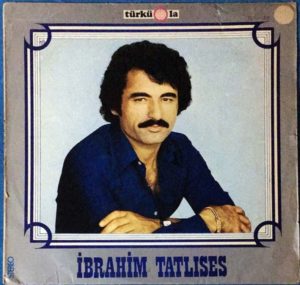 Ibrahim Tatlıses offered a cocky masculinity and message of self-confidence to the oppressed. He also offered a irritating duality in his art that was all too often annoying and extremely manic-depressive. He would sing an absolutely heartbreaking and impressive lament the one minute, only accompanied by the saz and with tears in his eyes, completely living the pain, and with an incredible voice where most others would detonate a hundred times per minute. The next minute he’d jump up, bring a belly-dancer on stage, and start to dance around to an up-tempo song that was dealing with f.e. “full, bouncing tits” in its lyrics. While the tears on your face would dry in shock in face of these shizophrenic changes, you couldn’t help yourself but think “You godless dog, you messed up my feelings”.
Ibrahim Tatlıses offered a cocky masculinity and message of self-confidence to the oppressed. He also offered a irritating duality in his art that was all too often annoying and extremely manic-depressive. He would sing an absolutely heartbreaking and impressive lament the one minute, only accompanied by the saz and with tears in his eyes, completely living the pain, and with an incredible voice where most others would detonate a hundred times per minute. The next minute he’d jump up, bring a belly-dancer on stage, and start to dance around to an up-tempo song that was dealing with f.e. “full, bouncing tits” in its lyrics. While the tears on your face would dry in shock in face of these shizophrenic changes, you couldn’t help yourself but think “You godless dog, you messed up my feelings”.
Two classic records of Ibrahim Tatlıses should be mentioned here nevertheless: his 1982 release Mutlu Ol Yeter and especially his masterpiece Mavi Mavi (1985), a record which the ‘little people’ made to Turkey’s best selling record ever. Both records were recorded in Tatlıses’ prime and with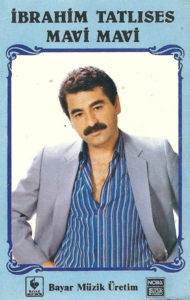 an outstandingly fine orchestra: ‘Leylim Ley‘, a lament of the yearning for one’s country and nation during exile/migration, has become cult in Turkey, and ‘Yanlizim‘ (“I Am Alone“) sums up the entire ‘au naturel male’ appeal of the arabesque genre, with accomplished men admitting to their vulnerability and breaking down under their pain: “There is no suffering left that I didn’t suffer through / There’s no street and corner left where I didn’t cry / I’m alone my friends, I’m alone, alone! / There’s no trace left from my former self / I’m tired torment / Hold my arms, or I’m gonna fall down / I’m alone my friends, I’m alone, alone”.
an outstandingly fine orchestra: ‘Leylim Ley‘, a lament of the yearning for one’s country and nation during exile/migration, has become cult in Turkey, and ‘Yanlizim‘ (“I Am Alone“) sums up the entire ‘au naturel male’ appeal of the arabesque genre, with accomplished men admitting to their vulnerability and breaking down under their pain: “There is no suffering left that I didn’t suffer through / There’s no street and corner left where I didn’t cry / I’m alone my friends, I’m alone, alone! / There’s no trace left from my former self / I’m tired torment / Hold my arms, or I’m gonna fall down / I’m alone my friends, I’m alone, alone”.
I now know how special my first concert has been: Ibrahim Tatlises in front of the Cologne Cathedral in 1987, during his prime, where he performed these songs. It was a historical event, the first event in Germany where the Turkish ‘guest-workers’ could be seen gathered publicly outside of a factory. I was 6 and watched the spectacle sitting on the shoulders of my father.
His love life was a telenovela with a touch of Frank Sinatra mafia vibes. In 1984, newspapers reported the arrest of Ibrahim Tatlıses, because he had pulled a Clint Eastwood, and beaten up his second wife, actress Perihan Savas: “He beat me up all night relentlessly” she reported. Tatlıses corrected her: “I punched her two times. I used to be an iron-worker, so my hand is very heavy.” As reasons for the domestic violence he named jealousy and 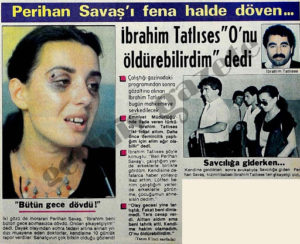 honor: “She was hanging around with other men at the venue where I took the stage every evening. I warned her several times to act more dignified and closed-up as the mother of my child. We argued again that night and she gave me cocky answers and provoked me.” , adding that “I could have killed her“. In later years, other remarks he made included “A real woman must be able to take some beating” “There are three types of women: one for the day, one for a week, and then one for life”. But also: “All painful stories I have lived through carry the signature of those who I have loved.” Here speaks a very full-hearted man, and it’s safe to assume that he never met his match in life: “My best friend would be somebody who is like myself.“
honor: “She was hanging around with other men at the venue where I took the stage every evening. I warned her several times to act more dignified and closed-up as the mother of my child. We argued again that night and she gave me cocky answers and provoked me.” , adding that “I could have killed her“. In later years, other remarks he made included “A real woman must be able to take some beating” “There are three types of women: one for the day, one for a week, and then one for life”. But also: “All painful stories I have lived through carry the signature of those who I have loved.” Here speaks a very full-hearted man, and it’s safe to assume that he never met his match in life: “My best friend would be somebody who is like myself.“
His one woman for life, his long-term partner Derya Tuna, got shot down with a bullet in her leg in front of cameras. The exact same thing happened to his long-term mistress of the same period, star belly-dancer Asena, who took a bullet in her foot when she was about to enter the TV studio to appear in Tatlıses’ own TV show. Theories range from Ibrahim Tatlıses having asked his mafia friends to ‘warn’ the women after they had dressed too permissively and jealously fought with each other publicly in boulevard papers; over to the women letting shoot each other out of jealousy. In Turkey they say that the gates to paradise lay under the feet of women and mothers, and that the beaters of same would be punished ten times harder one day. And indeed, God’s fist hit Tatlıses so hard that he could barely recover from it.
First, Ibrahim Tatlıses had confused the success of his voice and entertainment with real popularity and dared to step into politics, a very different field than entertainment. For the Turkish parliamentary elections 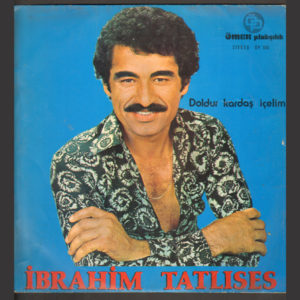 in July 2007, İbrahim Tatlıses initially run as an independent candidate in his hometown Şanlıurfa, then later as candidate of the Genç Party in Istanbul; and suffered a bitter defeat: the Genç Party received around 3 percent of the votes. 4 years later, in 2011, he decided to run as candidate for President Erdogans AK Party, writing him “Me and my friends love your ways. We never saw a president like you. May your successes be ongoing. Sincerely, Ibrahim Tatlises.“
in July 2007, İbrahim Tatlıses initially run as an independent candidate in his hometown Şanlıurfa, then later as candidate of the Genç Party in Istanbul; and suffered a bitter defeat: the Genç Party received around 3 percent of the votes. 4 years later, in 2011, he decided to run as candidate for President Erdogans AK Party, writing him “Me and my friends love your ways. We never saw a president like you. May your successes be ongoing. Sincerely, Ibrahim Tatlises.“
Then on the evening of 13th March 2011, Tatlıses was target to a brutal armed attack and got shot down after leaving a TV show. He had several construction projects in Iraq and had refused to pay a share of 20% to the Kurdish terrorist organization PKK, who finances itself with extortion and drug-trafficking. As result, one bullet of a Kalashnikow went through Tatlıses’ head, leaving him heavily injured and in very critical conditions for many months. It was a true wonder that he survived after undergoing multiple emergency-surgeries and a rehabilitation that lasted almost two years. During that rehabilitation, he married his third wife – his assistant that got shot down with him- and made his seventh child during the marriage which lasted two years. Drama never dies.
I won’t lie, I have a weakness for Ibo no matter what, and one that goes beyond his divine voice and art. Rude, choleric, but also blessed with a big, golden heart, never fake, and deeply rooted in an exotic moral-codex of honor- I love the paradise birds that are the salt to our soup. Truth is that without his hot-headed temper and power-machismo, without being constantly lit & burning, and healthily underestimating comfort and harmony, he would have never made it out of the ‘cave’, and such an extraordinary life and career would not have taken place. Its beauty lays, as with Sinatra, in the contrasting vulnerability and feeling Tatlıses could invoke in his vocal introspection and performance.
Thank you for all the wonderful songs and stories, Ibo ❤️
by Saliha Enzenauer

I knew Ibo first time in 2005, where my friend introduced me to his song Aramam ( 2004 ). And from that time till now I couldn’t escape from his unique art. Absolutely I can call myself now an expert of Arabesk music “ with such legendary singers such Müslum gurses, Orhan Gencebay, Ferdi Tayfur, and Adnan Şenses and so on “ but Ibo is the highest voice, music, tune you could ever find and listen to. I don’t tend to talk a lot but Ibo changed my whole life and my taste of music no kidding.
One advice to anyone wants to know exactly why Ibo is the greatest singer you could ever know, simply this is a list of his best songs ever and can easily beat songs such Mavi Mavi or Mutlu ol yeter. Best song ever for him Is Acı gerçekler, also nasıl isyan etmem , isyan etmek boşuna , yaşamak bu değil and gülmemiz gerek . And a unique strong voice similar to uzun hava is olursem kabrime gelme .
I really liked your article and that covered almost of most his part of life and career. Wanted just to spot a small light to his songs that made him” Ibo “ an unrepeated voice and an artist can’t be compared to anyone. I’m not biased, but Ibrahim’s voice beyond my justice and fairness.
Highly respected, Sincerely with love spread, Salman. Saudi Arabia 🇸🇦
Salām Salman, thank you very much for your passionate comment. Ibo indeed has the power to change ones life, what a voice, its unparalleled. “Isyan Etmek Bosuna” is one of my favorite songs by him on the Mutlu Ol Yeter album, what a voice and beautiful music. But thousand thanks for reminding me of ‘Ölürsem Kabrime Gelme’, what a sensational song on so many levels, what an endlessly streched lament- “Don’t come to my grave if I die”. Here’s a man ready and preparing to die of a broken heart, but already taking care of that this guilty love finds no forgiveness and redemption once he’s gone- extremely complex. And Ibo simply destroys, who is Pavarotti? Thank you Salman, and turko-alman greetings to Saudi Arabia! Saliha
Don’t come to my grave if I die.
I don’t wanna die groaning and yammering
I don’t want to, Allah, I don’t want to.
Don’t wipe of my running tears
I don’t want your condescending pity and love,
I don’t want it.
Salam seni de Saliha. I have much respect to Pavarotti but it teases me a lot when people saying Ibo is the turkish Pavarotti. Ibrahim is higher, again with much respect, it should be called Italian Tatlises for Pavarotti not the opposite.
Loved everything you wrote related to these two songs. Gerçekten damar bir şey bu ikinci şarkılar. I tend to write in turkish because just to show how 16 years of Arabesk can affect someone hh. Ama gerçekten language isn’t a factor to Arabesk or any different music type. People have been asking me how could you listen to Arabesk when you don’t understand turkish. I now understand it but this wasn’t an issue. First place listening to Arabesk was only for its unique melodies. With Ibo, Ferdi, Müslüm, Orhan, bulent, i was only considering the voice, music, and tune. I call it “The pyramidal tripartite “.
I really again thank you for your amazing article and for your reply.
Fascinating!
Saliha,
This is the most complicated of your Crazy Turks journalism and research: a boy who endured economic humiliation and impoverishment and then rose up to be a musician superstar in Turkey but also a man who could clearly be abusive and macho and was himself the target of violence.
The most special section of this story is where you share with the reader sitting on your father’s shoulders watching him perform in Cologne in 1987 at the age of six.
Thank you, Mark
You’ll write the somewhat different book about Turkey 🇹🇷 Can’t wait to read them all, Saliha!
You have a way of making him loveable. Love your portraits, you have a very unique style. I don’t know how you look, but I can hear you talk. If you know what I mean!
Thank you very much!
The iron hand 😂 Fantastic feature!
“The Emperor”- intimidating.
What a marvelous quote to start this article. Ibrahim´s story is a proof that you have to take and embrace the risky opportunities of life, no matter where they lead (imagine, he would´ve disappeared inside the construction sites).
I´m very curious about those “schizophrenic changes”, that kind of energy is rare and hard to convey. I´ll start with Mavi Mavi (1985)- that period of his life was thunderous and highly controversial.
Now, things start to make sense, the four “Arabesk” kings are somehow connected. It seems like each one attracts an specific kind of audience, and (at the same time) they belong to the same “realm”.
Thank you Saliha, great discovery- absolutely out of my geographical radar.
Hi Octavio, that’s exactly what makes his charm- I often think about huge talents disappearing in slums and construction sites, with the talents never having an opportunity to flourish, bloom, develop, and become art. Ibo was different and made it, no matter how ‘high’ or ‘low’ his art may be considered, but never forgot his roots and the experiences of oppression, being looked down on he had made. Therefore he became both, an identification- but also hate- figure for many.
Enjoy his Mavi Mavi, his music is not as sophisticated as Gencebay’s, but his voice simply destroys on some of the songs on there. It is uniquely multi-dimensional, with laments expressing pain, accusation, despair, fatigue and more, all at the same time… Mutlu Ol Yeter is also a masterpiece in my opinion, with psychedelic laments of unseen epic proportions https://www.youtube.com/watch?v=Jlyz3m7ccHw
Enjoy and thank you for your comment.
Oh my goodness, Ibrahim Tatlises is such a legend. What a powerful sound he has.
Awesome story, I laughed and cried while reading this. You can clearly see where he comes from, loved the bits about his childhood and youth, particularly the water-selling story. What a guy!
It’s a powerful story that tells and explains a lot about him and his ambition and strength. Love it, too.
I love Ibo.. This is the best Song ever.. Ibo is the Best Artist in Turkey.. Greating from Greece.. Bravo
Kalispéra arkadaş! I know Ibo is very popular in Greece (and the Middle East). Back in 2000 they were playing his ‘Akdeniz Aksamlari’ nonstop when I was in Thessaloniki.
In an age of sanitized music and media, we can be glad that a few still move along their own paths. We have grown so acustom to the shallownessness to art and entertainment in the West that that we reject those artists that don’t fit into our neat little boxes. Long live these emperors! Long live the kings that breathe life into the sterile world. Great article. These keep getting better and better. Can’t wait to see what’s next
Thank you, especially since up to the 00s it was a different and less ‘sanitized’ time everywhere, many Western artists who got succesful and famous back then would have no chance nowadays because of some kind of ‘inappropriate behaviour’. Ibo also got a lot of shit in Turkey, two times involved in domestic violence and stubbornly singing in his peasant dialect to this day, he was stigmatized and labeled off as some uncultivated and barbaric man forever. Anyway, an interesting difference can be found in terms of masculinity, which even the psyched out Anatolian Rock stars like Baris Manco, Erkin Koray and Cem Karaca displayed with absolute confidence, no question about that. That is very different here.
I must find myself a Turkish man. These guys all look insanely good😍
Who am I to disagree…
Laughed and cried reading this. What a larger-than-life character!